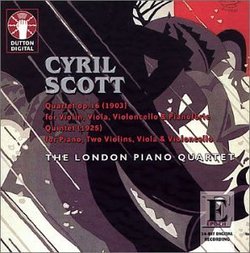| All Artists: Cyril Scott Title: Cyril Scott: Chamber Music Members Wishing: 0 Total Copies: 0 Label: Dutton Labs UK Release Date: 4/9/2002 Album Type: Import Genre: Classical Styles: Chamber Music, Historical Periods, Classical (c.1770-1830) Number of Discs: 1 SwapaCD Credits: 1 UPC: 765387711627 |
Search - Cyril Scott :: Cyril Scott: Chamber Music
CD Details |
CD ReviewsThe 'English Debussy' revived Dr. Richard M. Price | London, UK | 01/23/2004 (4 out of 5 stars) "Cyril Scott gained a European reputation around 1910 as the leading English avant-garde composer of the day (though the sobriquet `the English Debussy' was misleading, since the spirit of his music is closer to that of Strauss or Korngold). His harmonic language was one of uninterrupted enharmonic modulations (which Berg found `mushy'), with harmonic resolution only at the end of movements. Still more striking was the way he treated his motifs, which constantly expand and contract, generating irregular barring, thereby anticipating Stravinsky's Rite of Spring, as analysed by Boulez in a famous essay. On the present CD we may ignore the early Piano Quartet, but the Quintet is an excellent example of Scott's manner. Its Grainger-like exhilaration, maintained without a break through a long work, goes together with a strange absence of passion; creative energy, not human emotion, was the main drive in Scott's life and art.
There is some confusion over the date of composition. Laurie Sampsel, in her `Cyril Scott: A Bio-Bibliography,' distinguishes between this quintet, `premiered' in 1920 and published in 1925, and an unpublished piano quintet composed in `ca. 1914' as a revision of a sextet first performed in 1903. But the description of the latter in Eaglefield Hull's `Cyril Scott' (1917) reveals the two to be the same work; Hull provides the information that it was written in 1911-12 on the basis of portions saved from the early sextet. Since, however, the idiom of the work in both harmony and rhythm absolutely excludes a date as early as 1903, and is closely akin to Scott's works of the period 1910-14, the old material must have been completely recast. The performance of this CD is assured and fluent, and may well be the best performance of a Scott work that has appeared since the Lyrita LPs of his piano concertos, with Ogdon and Herrmann." |

